| Article ID | Journal | Published Year | Pages | File Type |
|---|---|---|---|---|
| 4929007 | Transportation Research Part A: Policy and Practice | 2017 | 12 Pages |
Abstract
Although bicycling has been the subject of increasing academic attention, particularly in the areas of mode choice, benefit analyses, and discussions of policies/treatments, much less attention has been devoted to actually studying how communities have made decisions about whether and what they will implement in regards to bicycle infrastructure. “Policy entrepreneurs” are theorized as actors centrally responsible for either creating an opportunity or capitalizing on an opportunity to pair a public problem with a policy solution. A survey instrument solicited directly the participation of the 200 most populous municipalities within the United States. Using a variety of analytical tools (and merged data sources) a model of municipal transportation policy change is developed that contributes an important perspective to the existing paradigm of policy process theory. Neither individual policy entrepreneurs nor their role or qualities were not significant effectors of change, despite being regularly present. However, where networks of supportive actors (including strong champions/policy entrepreneurs) were present they played a critical role in making projects happen and at larger scales. This finding puts additional emphasis moving forward on the collaborative nature of municipal policy change. Advocates and planners may be more successful by being attuned to these networks and political contexts and taking advantage of open “windows” of engagement, or by 'manually' opening these windows. Lastly, city population was also associated with implementation, suggesting underlying factors to be explored in the future.
Related Topics
Physical Sciences and Engineering
Engineering
Civil and Structural Engineering
Authors
Johann Weber,
